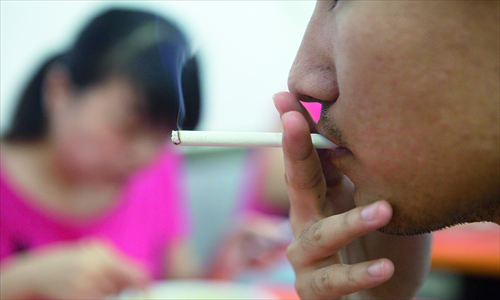Restaurants fail passive smoke test

An environmental protection NGO issued a report Thursday highlighting the continuing problem of secondhand smoke in indoor public areas.
The report was released by Beijing-based NGO Green Beagle, who hope to draw attention to the continuing problem of smoking in public areas.
Wang Qiuxia, a researcher at Green Beagle, said they visited 43 restaurants in the capital with an air monitoring device to measure levels of PM2.5 (particulate matter) pollution. The names of the restaurants were not revealed.
The results reveal that in the majority of the restaurants surveyed, PM2.5 levels exceeded the standards set by the World Health Organization (WHO) by 14 times. The WHO level for PM2.5 is 10 micrograms per cubic meter, while that found in the restaurants was on average over 140 micrograms per cubic meter.
"We issued the report to raise public awareness of not smoking in public areas as well as to provide evidence for anti-smoking legislation," Wang said.
Cui Xiaobo, professor of the Health Management and Education Institute of Capital Medical University who helped draft a national anti-smoking law for public areas in 2008, said the law has not functioned well since then.
"One reason for this is there are not enough law enforcers to cover the whole city these days," he said.
"Another reason is that the current law states that only the administrators of the public venues will be punished instead of the smokers too," Cui noted.
It is absolutely prohibited to smoke in public venues such as health and education facilities and on public transportation in Beijing, said Cui.
"But places like restaurants are allowed to have smoking sections and therefore are not 100 percent smoke-free," he said.
Li Qiang, a research scientist of the China tobacco control office, said that regulations from the Ministry of Health and the municipal health bureau are different, which also causes problems.
"The ministry's regulation says all public areas should be smoke-free while the bureau's allows restaurants to have their own smoking sections," he said.
"This conflict creates an ambiguity in enforcing the law," Li said.
In 2006, China signed up to the WHO-initiated Framework Convention on Tobacco Control, but since then a number of attempts to introduce smoking bans have failed.
The Ministry of Health announced that smoking would be banned in public enclosed spaces from May 1, 2011, including restaurants and bars, however, enforcement of this regulation has been non-existent, and restaurant owners have struggled to persuade customers not to smoke.
Li Fu, general manager of Yanji Cold Noodle Restaurant chain, said that despite the fact that his restaurants are smoke-free by law, there are many people still smoking in them while dining.
"All we can do is appeal to them to smoke outside but if they don't, there is nothing we can do," he said.
"They could make trouble at the restaurant," said Li.
Alongside the report, Green Beagle plans to launch an iPhone application that lists the 500 local smoke-free restaurants, said Wang.
"The names of these restaurants could also be found online just to give people who want to go to smoking-free restaurants a reference to look to," she said, "the app will be available for download on iTunes later this month."
Beijing government announced a new draft law in March 2012, in which there were to be tougher fines for both venues and violators, but so far, new legislation has not been revealed.
Jiang Yuan, vice director of the tobacco control office of the Chinese Centers for Diseases Control and Prevention said China has over 300 million smokers, and the majority of the population is affected by passive smoking.
"Every year, 100,000 people die from the effects of secondhand smoking in China," Jiang said.
"I believe that smoke-free legislation is the only efficient way to tackle this problem," she noted.